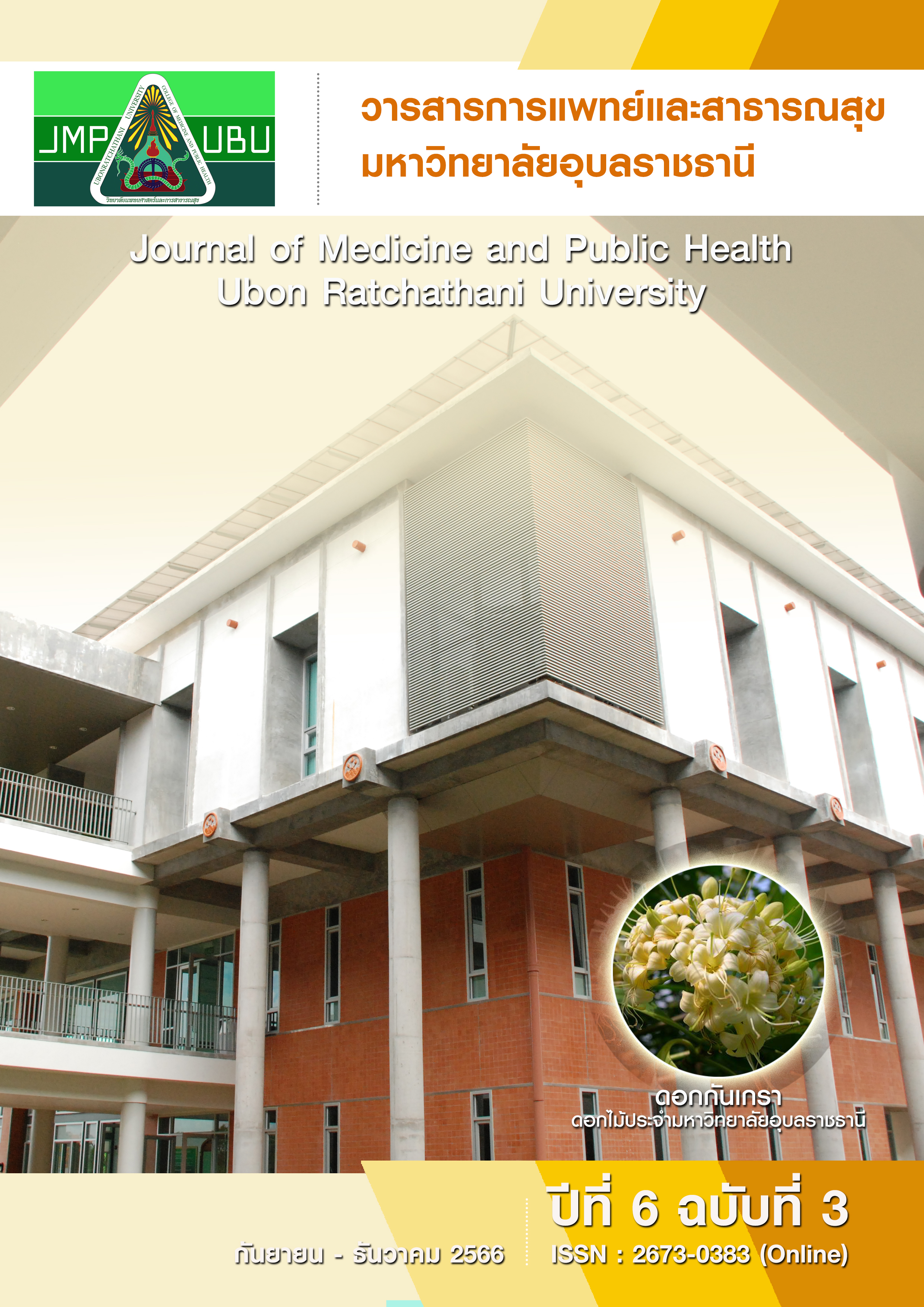การปรับตัวในการจัดบริการโรคไม่ติดต่อในช่วงสถานการณ์โควิด-19 เขตสุขภาพที่ 10
คำสำคัญ:
การปรับตัวการจัดบริการ, โรคโควิด-19, โรคไม่ติดต่อบทคัดย่อ
การวิจัยครั้งนี้เป็นการวิจัยเชิงคุณภาพมีวัตถุประสงค์เพื่อถอดบทเรียนการปรับตัวในการจัดบริการโรคไม่ติดต่อ และประเมินความยั่งยืนของการจัดบริการจากสถานการณ์โควิด-19 ในสถานบริการสุขภาพในเขตสุขภาพที่ 10 รวม 9 แห่ง ผู้ให้ข้อมูลหลักเป็นผู้ที่เกี่ยวข้องกับการบริการโรคไม่ติดต่อ 62 คน เก็บข้อมูลเดือนมิถุนายน - พฤศจิกายน 2564 โดยวิเคราะห์เอกสาร สัมภาษณ์แบบกึ่งมีโครงสร้าง และการสนทนากลุ่ม วิเคราะห์ข้อมูลเชิงเนื้อหาและโครงสร้าง และสรุปประเด็นสำคัญ ผลการวิจัยพบว่าโรคไม่ติดต่อเป็นปัญหาสำคัญและมีผู้ป่วยสูงสุด แม้จะได้รับผลกระทบจากการจัดบริการวิถีใหม่ แต่ผลลัพธ์การบริการยังคงเดิม การปรับระบบบริการมีดังนี้ 1) ระบบบริการ มีช่องทางที่หลากหลาย 2) กำลังคนด้านสุขภาพ มีการพัฒนาศักยภาพบุคลากรด้านการบริการโรคไม่ติดต่อ 3) ระบบสารสนเทศ มีการใช้โปรแกรมให้บริการในทุกระดับ แต่ยังขาดการเชื่อมโยง 4) เทคโนโลยีด้านการแพทย์ ได้เพิ่มช่องทางการส่งมอบยา โดยผ่านบริษัทเอกชน ร้านยาเอกชน ทางไปรษณีย์ อาสาสมัครสาธารณสุขประจำหมู่บ้าน 5) การบริหารจัดการงบประมาณ พบว่าเพียงพอสามารถบริหารจัดการได้ 6) ภาวะผู้นำและธรรมาภิบาลของระบบ ผู้นำริเริ่มในปรับการบริการ และจัดสรรทรัพยากรให้เพียงพอ และ 7) ระบบสุขภาพชุมชนที่เชื่อมโยงกัน ส่วนความยั่งยืนจะเกิดขึ้นได้จาก 5 ส่วน คือ 1) นโยบายของเขตสุขภาพ 2) ผู้บริหารของสถานบริการ 3) เครือข่ายความร่วมมือในระดับอำเภอ 4) ระบบข้อมูลที่มีการเชื่อมโยงกัน และ 5) การมีส่วนร่วมของคนในชุมชน ประเด็นที่ควรพัฒนา ได้แก่ 1) พัฒนาระบบสารสนเทศให้เชื่อมโยง 2) ระบบการแพทย์ทางไกล 3) ความร่วมมือกับร้านขายยาชุมชน และ 4) การกำกับดูแลตนเองของผู้ป่วย
Downloads
เอกสารอ้างอิง
World Health Organization. WHO Coronavirus (COVID-19) Dashboard [Internet]. [Cited 2021 Sep 24] Available from: https://covid19.who.int/
กรมควบคุมโรค กระทรวงสาธารณสุข. โรคติดเชื้อไวรัสโคโรนา 2019 (COVID-19) [อินเทอร์เน็ต]. [สืบค้นเมื่อ 24 ก.ย. 2564]. แหล่งข้อมูล https://ddc.moph.go.th/viralpneumonia/index.php
จิรุตม์ ศรีรัตนบัลล์, นพพล วิทย์วรพงศ์, ธีระ วรรธนารัตน์, สุรีรัตน์ งามเกียรติไพศาล, วรากร วิมุติไชย, ฬุฬีญา โอชารส, และคณะ. รายงานวิจัยการตอบสนองและเตรียมการของระบบบริการสุขภาพไทยต่อวิกฤติการระบาดของ COVID-19: การดำเนินการของโรงพยาบาล และผลกระทบทางเศรษฐกิจและสังคมภายในขอบเขตของระบบสุขภาพ. กรุงเทพฯ; 2564.
ศิริวรรณ พิทยรังสฤษฎ์, นัตยา ตั้งศิริกุล. รายงานวิจัยผลกระทบและการปรับตัวของนโยบายและระบบบริการสุขภาพ (ภาครัฐและเอกชน) สำหรับโรคไม่ติดต่อ (Health service response) ระหว่างช่วงการระบาดของ COVID-19 รอบแรกและรอบสอง. นนทบุรี; 2564.
เขตสุขภาพที่ 10. เอกสารประกอบการประชุม EOC Covid-19 เขตสุขภาพที่ 10 วันที่ 20 ก.ย. 2564.
กระทรวงสาธารณสุข. รายงานตามตัวชี้วัด NCDplus [อินเตอร์เน็ต]. [สืบค้นเมื่อ 24 ก.ย. 2564]. แหล่งข้อมูล https://hdcservice.moph.go.th/hdc/main/index.php
ประภาพรรณ อุ่นอบ (บรรณาธิการ). การประเมินภายใน: เครื่องมือเพื่อการเรียนรู้และการพัฒนา โครงการสร้างเสริมสุขภาวะ. กรุงเทพฯ: พี.เอ.ลีฟวิ่ง จำกัด; 2564.
World Health Organization. Monitoring the building blocks of health systems: A handbook of indicators and their measurement strategies. Geneva: WHO Document Production Services; 2010.
ศิริเกษม ศิริลักษณ์. การจัดการความรู้ระบบสุขภาพอำเภอพึงประสงค์ โดยใช้หลักการ Six Building Block Plus One. พิษณุโลก: มหาวิทยาลัยนเรศวร; 2563.
สำนักงานคณะกรรมการสุขภาพแห่งชาติ. พระราชบัญญัติสุขภาพแห่งชาติ พ.ศ.2550 [อินเตอร์เน็ต]. [สืบค้นเมื่อ 10 พ.ค. 2566]. แหล่งข้อมูล http://www.nationalhealth.or.th/index.php?option=com_content&view=article&id=87&Itemid=130
สำนักงานคณะกรรมการสุขภาพแห่งชาติ. ระเบียบสำนักนายกรัฐมนตรี ว่าด้วยการจัดตั้งเขตสุขภาพเพื่อประชาชน พ.ศ. 2559 [อินเตอร์เน็ต]. [สืบค้นเมื่อ 10 พ.ค. 2566]. แหล่งข้อมูล
https://infocenter.nationalhealth.or.th/node/19135
กรมส่งเสริมการปกครองส่วนท้องถิ่น กระทรวงมหาดไทย. ระเบียบสำนักนายกรัฐมนตรีว่าด้วยการพัฒนาคุณภาพชีวิตระดับพื้นที่ พ.ศ.2561 [อินเตอร์เน็ต]. [สืบค้นเมื่อ 10 พ.ค. 2566]. แหล่งข้อมูล http://www.dla.go.th/upload/regulation/type2/2018/4/1589_1.pdf
ทัศนีย์ ญาณะ, พฤกษา บุกบุญ. ระบบสุขภาพชุมชน โดยชุมชน เพื่อชุมชน. กรุงเทพฯ: บียอนด์ พับลิชชิ่ง จำกัด, 2556.
สุชีรา บรรลือศิลป์. รายงานการวิจัยผลการทบทวนผลกระทบจากการระบาดของโรคโควิด-19 ต่อโรคไม่ติดต่อและปัจจัยที่เกี่ยวข้องในระดับโลก. นนทบุรี; 2564.
World Health Organization. Rapid assessment of service delivery for NCDs during the COVID-19 pandemic 2020 [Internet]. [Cited 18 June 2021]. Available from: https://www.who.int/publications/m/item/rapid-assessment-of-service-delivery-for-ncds-during-the-covid-19-pandemic
ประภา ราชา, จารุภา คงรส, และธนพร สดชื่น. การพัฒนาระบบบริการพยาบาลผู้ป่วยโรคไม่ติดต่อเรื้อรังในสถานการณ์การแพร่ระบาดของโควิด-19. วารสารแพทย์เขต 4-5 2563; 39(3): 414-26.
บุษยมาส บุุศยารัศมี. การพัฒนารูปแบบการดูแลผู้ป่วยเบาหวานหรือความดันโลหิตสูงในยุควิถีใหม่ เขตอำเภอเมือง จังหวัดนครปฐม. วารสารแพทย์เขต 4-5 2566; 42(1): 66-77.
จุรีพร คงประเสริฐ, ณัฐธิวรรณ พันธ์มุง, ประภัสรา บุญทวี. ผลกระทบจากการแพร่ระบาดโรคโควิด-19 ต่อการพัฒนาคุณภาพของคลินิกโรคไม่ติดต่อ: โรงพยาบาลชุมชนในประเทศไทย. วารสารศูนย์การศึกษาแพทยศาสตร์คลินิก โรงพยาบาลพระปกเกล้า 2565; 39(4): 429-37.
จารุวัณย์ รัตนะมงคลกุล. แอปพลิเคชันไดเอทซ์ (Dietz): เทเลเมดิซีนเพื่อการติดตามการรักษาและการดูแลตัวเองของผู้ป่วยเบาหวาน. Journal of the Thai Medical Informatics Association 2022; 1: 46-54.
Songsermpong S, Bunluesin S, Khomgongsuwan P, Junthon S, Cazabon D, Moran AE, Garg R, et al. Innovations to Sustain Noncommunicable Disease Services in the Context of COVID-19: Report from Pakkred District, Nonthaburi Province, Thailand. Global Heart 2021; 16(1): 44. DOI: https://doi.org/10.5334/gh.1003
วนิดา สมภูงา, มะลิ สุปัตติ. ประสิทธิผลการพัฒนารูปแบบการบริหารจัดการโรคเบาหวานด้วยหลักการ 6 building blocks จังหวัดศรีสะเกษ. วารสารวิจัยและพัฒนาระบบสุขภาพ 2565; 15(1): 142-55.
วนิดา สมภูงา, พุทธิไกร ประมวล. การพัฒนาและการประเมินผลของรูปแบบการจัดการตนเองแบบมีส่วนร่วมในการปรับเปลี่ยนพฤติกรรมการควบคุมระดับน้ำตาลในเลือดของผู้ป่วยเบาหวานชนิดที่ 2 ที่ควบคุมระดับน้ำตาลไม่ได้ จังหวัดศรีสะเกษ. วารสารวิจัยและพัฒนาระบบสุขภาพ 2565; 15(1): 273-87.
ดาวน์โหลด
เผยแพร่แล้ว
รูปแบบการอ้างอิง
ฉบับ
ประเภทบทความ
สัญญาอนุญาต
ลิขสิทธิ์ (c) 2023 วารสารการแพทย์และสาธารณสุข มหาวิทยาลัยอุบลราชธานี

อนุญาตภายใต้เงื่อนไข Creative Commons Attribution-NonCommercial-NoDerivatives 4.0 International License.
เนื้อหาและข้อมูลในบทความที่ลงตีพิมพ์ในวารสารการแพทย์และสาธารณสุข มหาวิทยาลัยอุบลราชธานี ถือเป็นข้อคิดเห็นและความรับผิดชอบของผู้เขียนบทความโดยตรง ซึ่งกองบรรณาธิการวารสารไม่จำเป็นต้องเห็นด้วย หรือร่วมรับผิดชอบใด ๆ
บทความ ข้อมูล เนื้อหา รูปภาพ ฯลฯ ที่ได้รับการตีพิมพ์ในวารสารการแพทย์และสาธารณสุข มหาวิทยาลัยอุบลราชธานี ถือเป็นลิขสิทธิ์ของวารสารการแพทย์และสาธารณสุข มหาวิทยาลัยอุบลราชธานี กองบรรณาธิการไม่สงวนสิทธิ์ในการคัดลอกเพื่อการพัฒนางานด้านวิชาการ แต่ต้องได้รับการอ้างอิงที่ถูกต้องเหมาะสม






